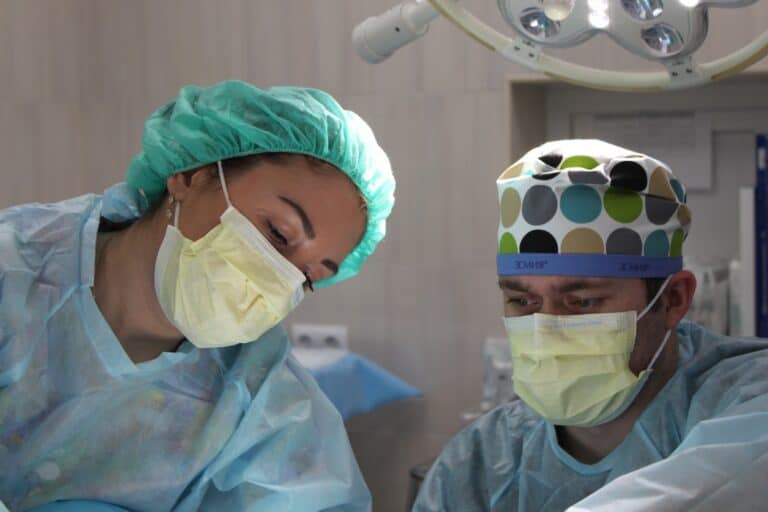How To Get Into Medical Sales: Unveiling A Lucrative Path (2023)
Are you looking for a rewarding and competitive career in medical sales, but don’t know where to start? Look no further than this step-by-step guide on how to get into medical sales.
With an average total compensation of $149,544, according to MedReps, the medical sales industry is both lucrative and promising for those with the right skills and dedication. So as you can imagine, lots of folks are wondering how to get into medical sales!
To succeed as a medical sales rep, you will need to possess essential skills such as communication, problem-solving, and strategic thinking. Additionally, having field experience and staying up-to-date with industry trends are crucial components of success in this niche field.
This high-level article will provide you with the tools necessary for you to figure out how to get into medical sales, and excel, by outlining key steps such as choosing a specialization, building an online presence, gaining field experience, and mastering the sales process and techniques.
By following these steps and putting in the time and work required, you can begin to figure out your dream of becoming a top-performing medical sales representative and put a plan into action.
Key Takeaways
- Choosing a specialization in medical sales should be based on your interests and passions, not just potential earnings.
- This article encompasses “medical sales”, not just device or capital – also Pharma. The intent is to help you understand how to get into medical sales. We will publish a post specifically related to medical devices (surgical sales) soon.
- Gaining field experience in sales and marketing, communication, organization, and technical expertise is crucial for success in medical sales.
- Becoming familiar with industry terms and acronyms, enrolling in training programs, and getting licensed or certified can all be advantageous for career prospects in medical sales.
- Staying up-to-date with industry trends and maintaining an online presence are essential for continuous learning, networking, and staying competitive in the field of medical sales.
Medical Sales Overview
So, you’re interested in how to get into medical sales representative? Well, let me tell you, this niche is not only lucrative but also competitive.
As mentioned before, medical sales reps have an average total compensation of $149,544 according to MedReps. But don’t be swayed solely by the potential earnings; first, it’s essential to understand the overview of what medical sales entails and why it’s a promising career path for those with dedication and drive.
Medical sales can refer to selling pharmaceuticals or medical devices to healthcare providers or other businesses within the healthcare industry. As a medical sales rep, you’ll be responsible for building relationships with potential clients and providing them with information about your products’ benefits and features. This role requires excellent communication skills, as well as knowledge of the products you’re selling and the market they’re in.
One reason why the question “how to get into medical sales” is so popular, is because it’s such a promising career path, and there will always be demand for healthcare products and services. Whether it’s new drugs or innovative devices that improve patient outcomes, there will always be new developments in this field that require knowledgeable professionals.
Additionally, because this role requires specialized knowledge and skill sets, it can command high salaries and offer opportunities for advancement within the industry. If you have a passion for healthcare innovation and are willing to put in the work required for success in this field, then figuring out how to get into medical sales makes a lot of sense!
Sales Representative Role
To excel as a medical sales representative, it’s crucial to hone your sales and marketing skills and stay up-to-date with industry trends. Here are four ways you can become a successful sales representative in the medical industry:
- Develop effective communication skills: As a sales representative, your ability to communicate effectively with potential clients is essential. You need to be able to explain complex medical concepts in simple terms, listen actively, and tailor your message to the needs of each client.
- Attend sales training programs: Whether you’re an experienced medical sales professional or looking for an entry-level role, attending sales training programs can help sharpen your skills and knowledge about the field. These programs offer insights into customer engagement strategies, product knowledge, and negotiation techniques that can give you an edge over competitors.
- Leverage technology platforms: Medical sales representatives must be comfortable using various technology platforms such as social media, email marketing software, CRM tools and other digital marketing solutions to connect with potential customers.
- Build strong relationships with healthcare professionals: To succeed in this competitive field, it’s important to build lasting relationships with healthcare professionals who will trust you as their go-to source for medical products or services.
By implementing these strategies consistently over time, you can establish yourself as a top-performing medical sales representative in the industry. Remember that building a successful career in medical sales requires dedication and hard work, but also offers significant financial rewards if approached strategically.
Choosing a Specialization
Ready to take your sales skills to the next level? Discover how choosing a specialization can help you stand out in the competitive field and start the process of learning how to get into medical sales. Whether you’re interested in pharmaceutical sales, medical device sales, or working with healthcare professionals and equipment manufacturers, selecting a niche within the industry can help you gain expertise and build credibility with potential clients.
To choose a specialization that aligns with your interests and passions, start by researching different sectors of the medical sales industry. Consider factors such as market demand, growth potential, and the types of products or services that appeal to you. Once you’ve identified your niche, focus on building knowledge and experience in that area through training programs, networking events, and other professional development opportunities.
Here’s an example table showcasing some specializations within medical sales:
| Specialization | Description |
|---|---|
| Pharmaceutical Sales | Selling prescription drugs to healthcare providers |
| Medical Device Sales | Promoting specialized equipment used in clinical settings |
| Biotech Sales | Marketing biotechnology products to research institutions |
| Healthcare IT Sales | Selling software solutions for electronic health records |
Choosing a specialization is just one step on the path toward learning how to get into medical sales. With dedication and hard work, it’s possible to build a rewarding career in this lucrative industry. Keep learning about new technologies and trends, stay connected with colleagues and mentors in your field, and always be willing to adapt your approach based on feedback from clients and customers.
Essential Skills and Experience
You’ll need to have sales and marketing skills, as well as strong communication, organization, and technical expertise to succeed in medical sales. As an entry-level sales professional, it’s important to hone these skills by gaining experience in related fields such as pharmaceuticals or healthcare services.
One effective way to do this is by working with a mentor or shadowing an experienced medical sales rep.
To further enhance your skills and increase your chances of success, consider enrolling in a training program designed specifically for medical sales reps. These programs can provide you with the knowledge and tools necessary to navigate the complex healthcare industry, stay up-to-date on industry trends, and build lasting relationships with clients.
Additionally, getting licensed or certified can give you a competitive edge when applying for jobs in this field.
In summary, learning how to get into medical sales (and then executing!) requires dedication and hard work. By developing strong sales skills, gaining relevant experience within the healthcare industry, and completing a comprehensive training program or certification process, you can position yourself for long-term success in this lucrative field.
Industry Terms and Acronyms
Feeling overwhelmed by the jargon and terms used within the medical sales industry? Don’t worry, there’s a solution. To succeed in your sales career, it’s important to become familiar with the language commonly used in the field.
The medical sales industry has its own set of unique terms and acronyms that can be confusing for both entry-level and experienced medical sales professionals. Medical sales reps sell various healthcare products and services to physicians, hospitals, clinics, and other healthcare organizations.
Some of the common terms used in this field include formulary, which refers to a list of medications covered by an insurance plan or hospital; reimbursement, which is the process by which healthcare providers get paid for their services; and product pipeline, which describes all drugs currently being developed or researched by a pharmaceutical company.
To better understand these terms and more like them, you can do some research on your own or seek guidance from existing medical sales professionals. Taking detailed notes during training sessions or meetings with colleagues can also help you remember new vocabulary words.
By expanding your knowledge of the language used within medical sales circles, you’ll be better equipped to communicate effectively with clients and colleagues alike.
Training and Certification
Acquiring appropriate training and certification is essential for those interested in pursuing how to get into medical sales. While it’s possible to gain field experience through entry-level positions, formal training programs provide a more comprehensive understanding of the industry and its requirements. These programs often cover topics such as product knowledge, customer relationship management, communication skills, and ethical sales practices.
When choosing a training program, it’s important to consider your learning style and career goals. Online courses offer flexibility but may lack hands-on experience, while classroom-based programs provide networking opportunities but require more time commitment. Additionally, industry-specific certifications can enhance your credentials as a successful medical sales rep and increase your marketability to potential employers.
As medical technology advances and competition increases in the healthcare market, staying current with industry trends is crucial for success in medical sales. Continuous learning through workshops or seminars can keep you informed about new products and market changes. Certifications such as Certified Medical Representative (CMR) or National Association of Pharmaceutical Representatives (NAPRx) membership can not only demonstrate your expertise but also connect you with other professionals in the field for continued growth opportunities.
By investing in your education and staying up-to-date with industry developments, you can position yourself for a lucrative career path in medical sales.
Career Advancement
Becoming a top-performing medical sales representative isn’t easy, but with dedication and a hunger for growth, you could potentially skyrocket your earnings.
As you progress in your medical sales career, it’s important to consider the various paths of advancement available. One way to achieve success is by constantly improving your skills and knowledge through additional training and education.
To truly excel, it may be necessary to obtain an advanced degree such as an MBA or specialized certification that aligns with your niche. This can give you the edge needed to stand out amongst competitors and open up new opportunities for advancement.
Networking with other professionals and maintaining a strong online presence can help you build relationships that lead to lasting career growth.
Ultimately, achieving success in medical sales requires hard work, continuous learning, and a passion for helping healthcare providers improve patient outcomes. By staying committed to advancing your skills and knowledge base while building meaningful connections within the industry, you can position yourself as a valuable asset in this rapidly growing field.
Staying Up-to-Date with Trends
Stay ahead of the game in medical sales by keeping up with industry trends and constantly learning, so you can position yourself as a valuable asset to potential employers. The medical industry is constantly evolving, and staying informed about new products, services, and technologies will give you a competitive edge in your role as a sales representative.
Here are some tips on how to stay up-to-date with industry trends:
- Attend conferences and trade shows: These events provide an opportunity to network with other professionals in the field, learn about new products and services firsthand from vendors, and attend educational sessions.
- Follow industry publications: Subscribe to relevant medical sales publications or newsletters that cover topics such as healthcare policies, product launches, market trends, and sales strategies.
- Maintain an online presence: Recruiters want to know that you’re active on professional social media platforms like LinkedIn or Twitter. Share articles related to the medical sales industry or write your own content to showcase your expertise.
By staying informed about industry trends, you can also better anticipate changes in the sales cycle for healthcare providers. This knowledge will allow you to tailor your pitches and marketing strategies accordingly. In addition, it’ll help establish credibility with potential clients who want to work with someone knowledgeable about their specific needs.
Remember that continuous learning is crucial for success not only in medical sales but any profession. Make sure to incorporate ongoing education into your career plan by attending workshops or taking courses related to selling techniques or product knowledge. By investing time into improving your skills and knowledge base, you’ll be able to continuously add value as a medical sales representative throughout your career.
Building an Online Presence
Now that you know the importance of staying up-to-date with trends in medical sales, it’s time to focus on building an online presence. As a medical sales rep, your online presence can help you connect with potential employers and showcase your skills and experience.
One platform that is particularly effective for this purpose is LinkedIn. Creating a strong LinkedIn profile can increase your job placement prospects and allow you to build professional relationships within the industry. To optimize your profile, make sure to include relevant keywords such as ‘device sales’ or ‘medical sales rep.’ Additionally, highlight any certifications or training programs you’ve completed in the field.
In addition to LinkedIn, maintaining a personal website or blog can also demonstrate your expertise and passion for medical sales. Writing about industry trends or sharing success stories from previous roles can show potential employers that you’re committed to continuous learning and growth in the field.
By building a strong online presence, you can set yourself apart from other candidates and position yourself for long-term success in medical sales.
Gaining Field Experience
Acquiring practical skills and knowledge in sales and marketing, communication, organization, and technical software is crucial for those interested in how to get into medical sales. Medical sales is a competitive field that requires dedication and hard work to succeed. Whether you are an entry-level or experienced professional, gaining field experience can help you stand out from the competition.
One way to gain field experience is through internships. Many companies offer internships to students or recent graduates to provide them with hands-on training in medical sales. Internships are also great opportunities for networking with professionals in the industry, which can lead to job offers or referrals. Another way to gain experience is by volunteering at healthcare organizations or attending industry events where you can meet other professionals and learn about new trends.
In addition to gaining experience through internships and volunteering, it’s important to continuously develop your skills through education and training programs if you’re interested in how to get into medical sales. Look for courses or certifications that focus on medical sales techniques, product knowledge, customer relations, and industry regulations. You can also attend conferences or webinars hosted by industry leaders who share their expertise and insights on the latest developments in medical sales. By combining field experience with ongoing learning opportunities, you can build a solid foundation for a successful career as a medical sales representative.
| Entry-Level Medical Sales | Experienced Medical Sales Reps |
|---|---|
| – Gain relevant work experience through internships | – Build upon existing skills with advanced training programs |
| – Attend healthcare events to network with professionals | – Participate in leadership development programs |
| – Obtain necessary licenses or certifications | – Stay up-to-date on industry trends |
| – Develop strong communication skills | – Establish long-term relationships with clients |
Note: The table above shows some tips for entry-level medical sales representatives compared to experienced ones on how they can improve their skills further and stay competitive in the field of medical sales representation.
Sales Process and Techniques
Improve your chances of standing out in the competitive medical sales field by mastering effective sales techniques that’ll make you an invaluable asset to any company.
Sales experience is crucial for success in this industry, but it’s not enough to simply have a background in selling products. As a medical sales representative, you’ll need to understand and master the unique sales process specific to healthcare products and services.
To become a successful medical sales rep, you must be able to demonstrate proficiency in the following areas:
- Building relationships: In order to sell healthcare products or services effectively, you need to establish strong relationships with clients. This requires building trust through active listening and effective communication skills.
- Understanding customer needs: Healthcare providers have different needs based on their specialties, patient demographics, and budgets. To meet these varied needs successfully, you must be able to identify them accurately and provide tailored solutions.
- Meeting sales quotas: Medical sales reps are often measured by their ability to meet or exceed challenging sales quotas within tight timelines. By understanding the importance of consistent performance metrics and working towards achieving them consistently, you can demonstrate your value as an employee.
By mastering these essential selling techniques for medical sales professionals, you can differentiate yourself from others in the industry and increase your chances of achieving success.
Remember that while it may take time and effort initially, investing in developing these skills will pay off handsomely over time as demand for healthcare products continues to grow at an unprecedented rate worldwide.
Frequently Asked Questions
What is the typical work schedule for a medical sales representative?
You’ll be happy to know that a medical sales representative’s schedule is flexible, allowing you to work from home and meet with clients on your own time. It’s the perfect job for balancing work and personal life. That said, there are certainly times when your schedule will be very busy, hours will be long, and breaks will come seldom. Remember, you’re working for your customers and their patients – that is what dictates your schedule!
Is it necessary to have a background in healthcare to become a medical sales representative?
No, a background in healthcare is not necessary to become a medical sales representative. However, gaining field experience and enrolling in training programs can help you develop the necessary skills for success in the competitive industry. It can be a chicken or egg situation, and you need to be creative in your ability to market yourself to “break in”. We can help!
How do medical sales representatives typically build and maintain relationships with healthcare providers?
To build and maintain relationships with healthcare providers, medical sales reps typically use a personalized approach. They research the provider’s needs, communicate effectively, and follow up regularly to ensure satisfaction. Building trust and credibility is key for long-term success. In the end, nothing keeps a customer coming back for more than your personal brand and credibility – be reliable and know what you’re talking about.
What are some common challenges that medical sales representatives face in their roles?
Common challenges faced by medical sales reps include fierce competition, tight regulations, resistance from healthcare providers, and rapidly evolving technology. However, with dedication and continuous learning, you can overcome these obstacles to succeed in this promising field.
What opportunities are available for career advancement in the medical sales industry?
The medical sales industry offers vast opportunities for career advancement. Many of the organizations you’ll work for are large, and have opportunities to advance into management, corporate sales, training, marketing, and many other roles.
Conclusion
By following these key steps, you can pursue a rewarding and competitive career in the lucrative industry of medical sales.
Remember, the answer to the question “how to get into medical sales?” isn’t toostraight forward. You have to come up with a plan. Choosing a specialization that aligns with your interests is a great first step, then honing essential skills, and finally, gaining field experience are crucial for success to help you land your first job.
Keeping up-to-date with industry trends, maintaining an online presence, and utilizing effective sales techniques will help you stand out from the competition.
As the adage goes, “success is not final; failure is not fatal: It is the courage to continue that counts.” So don’t give up on your journey towards becoming a medical sales representative.
Remain determined and dedicated to achieving your goals, and you will undoubtedly reap the benefits of this promising career path.
In conclusion, with hard work and persistence, you can achieve great success as a medical sales rep.
We wish you all the best on your journey towards becoming one!







2 Comments